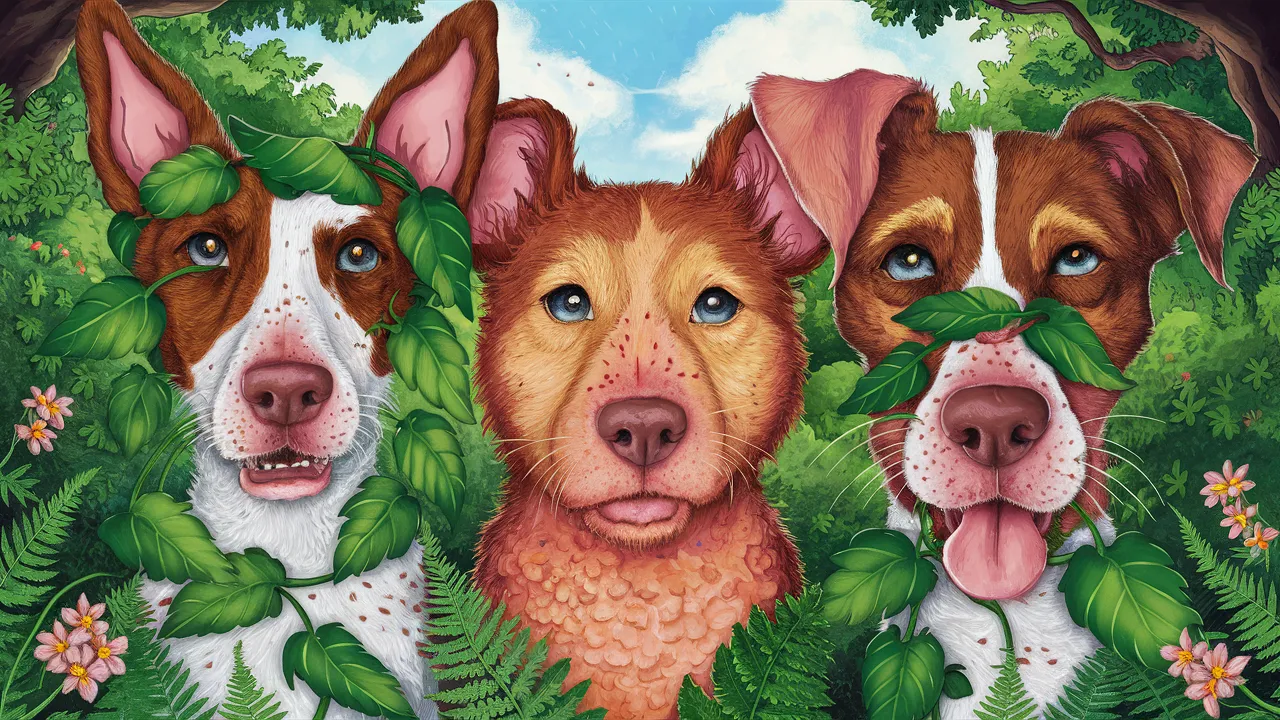Can Dogs Get Poison Ivy? Is your dog at risk from poison ivy? Learn about the effects of this plant on dogs, how to identify symptoms, and tips for prevention and treatment by Dogs Infor.
Understanding Poison Ivy
Poison ivy is a common plant found throughout North America, known for its ability to cause an itchy, blistering rash in humans. While dogs are less susceptible to the effects of poison ivy than humans, they can still experience reactions.
What is Poison Ivy?
Poison ivy is a vine or shrub with three leaflets, often described as “leaves of three, let it be.” It produces a sticky, oily substance called urushiol, which is the culprit behind the allergic reaction.
The Urushiol Oil
The real culprit behind poison ivy’s irritating effects is an oily substance called urushiol. This oil is found in all parts of the plant, including the leaves, stems, and roots. When urushiol comes into contact with skin, it can cause a severe allergic reaction.
Can Dogs Get Poison Ivy?
While dogs are less susceptible to poison ivy than humans, they can still experience reactions.
Yes, Dogs Can React to Poison Ivy
Dogs can develop allergic reactions to the urushiol oil found in poison ivy. While their symptoms may be milder than those experienced by humans, they can still be uncomfortable and require treatment.
Recognizing Poison Ivy Symptoms in Dogs
Skin Irritation and Itching
This is often the first sign that your dog has come into contact with poison ivy. You might notice them:
Licking excessively: They might lick at a specific area repeatedly, trying to soothe the itch.
Scratching: They might scratch at the affected area with their paws, causing redness and irritation.
Chewing: They might chew at the affected area, which can lead to further irritation and even hair loss.
Redness, Swelling, and Blisters
While less common than in humans, dogs can develop these symptoms as well:
- Redness: The skin may become red and inflamed, especially in the area where they came into contact with the plant.
Swelling: The affected area may swell, especially if they’ve been licking or chewing at it.
Blisters: While less common, some dogs may develop small blisters on their skin.
Other Possible Symptoms
- Hair loss: They might lose hair in the affected area due to excessive scratching or chewing.
- Lethargy: They might seem less energetic or more tired than usual.
- Loss of appetite: They might not be as interested in eating as usual.

How to Prevent Poison Ivy in Dogs?
Avoiding Contact with Poison Ivy
- Know Your Enemy: Learn to identify poison ivy so you can avoid it on walks.
- Stick to Trails: Stay on designated trails and avoid areas where poison ivy is known to grow.
- Keep Your Dog Leashed: This will help you prevent them from wandering into areas where poison ivy might be present.
Washing Your Dog After Walks
- Rinse and Repeat: Give your dog a good rinse with water after walks, especially if you’ve been in areas where poison ivy might be present.
- Use a Dog-Safe Shampoo: If you suspect your dog has come into contact with poison ivy, use a dog-safe shampoo to help remove any residual urushiol oil.
Using Dog-Safe Insect Repellent
- Protect from Pests: Some dog-safe insect repellents can also help deter ticks and fleas, which can carry other diseases.
Treating Poison Ivy in Dogs
Home Remedies (Consult Your Veterinarian First)
- Oatmeal Baths: Oatmeal baths can help soothe itchy skin.
- Cool Compresses: Applying cool compresses to the affected area can help reduce inflammation.
- Antihistamines: Your veterinarian may recommend over-the-counter antihistamines to help reduce itching.
Veterinary Treatment
- Prescription Medications: Your veterinarian may prescribe stronger medications, such as corticosteroids, to help manage severe symptoms.
- Antibiotics: If the affected area becomes infected, your veterinarian may prescribe antibiotics.
FAQ
How do dogs get poison ivy?
Dogs can get poison ivy through direct contact with the plant or by touching something that has come into contact with it.
What are the symptoms of poison ivy in dogs?
Symptoms include itching, redness, swelling, and blisters.
How can I prevent my dog from getting poison ivy?
Keep your dog away from poison ivy plants, wash their paws and fur after walks, and use a dog-safe insect repellent.
What should I do if my dog gets poison ivy?
Contact your veterinarian for advice on treatment.
Conclusion
Understanding the risks of poison ivy to your dog and taking preventive measures can help ensure their safety and well-being. By being aware of the plant, avoiding contact, and using appropriate precautions, you can minimize the chances of your dog experiencing an allergic reaction.

Related Post
Signs Your Dog Needs Probiotics: Digestive Problems
Green Stool In Dogs: Causes, Concerns And When To Worry
Dental Anatomy Of Dogs: Unveiling The Secrets